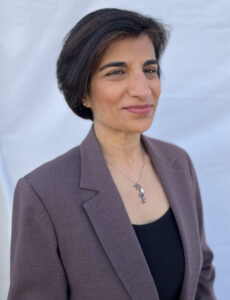
As a FUSE executive fellow, Mala Nanda (2016-17) worked with the Los Angeles County Department of Health Services (DHS) to help integrate its laboratory services and increase the efficiency of the lab system to ensure the highest quality of patient care throughout the network. She implemented an enterprise-first approach to evaluate clinical test operations and collaborated with clinical lab leadership to standardize and re-think various operations that had previously been outsourced, resulting in more than $500,000 of savings. Since the conclusion of her fellowship, Mala has continued to work for DHS as Director of Strategy and Operations for Diagnostic Services where she leads the transformation of all 10 clinical lab operations for LA County.
What was the impact of the FUSE fellowship on you, professionally and personally?
The FUSE fellowship came at a crucial point in my career. We had just moved back from China after eight grueling but fun years. I intended for my next career move to have more social impact. I wanted to use my leadership and operational skills from the private sector in either healthcare or education. I first heard about the fellowship from my sister Sonia Nanda (2016-17) who had already been accepted as a fellow. I was one of the first FUSE fellows in LA County in the 2016-17 cohort and an operationally focused fellowship was created with the objective of optimizing the clinical lab network for the DHS. After a successful fellowship and advisor role, I eventually applied for the DHS’ Director of Strategy and Operations for Diagnostic Services where I now oversee strategic operations for all 10 labs and have about 1,000 reports. Our vision is that we will provide equitable lab services access to all patients while operating as one lab in multiple locations rather than the traditionally siloed operations of independent entities.
No one could have predicted the pandemic. The DHS Labs were in the eye of the storm; we had to work very quickly and innovatively to develop COVID testing for our patients in an environment where testing equipment and FDA cleared tests were not easily available. The transformational work that began during my fellowship – and has continued in my current role – was instrumental in enabling the labs to work together creatively, leveraging each other’s strengths and removing obstacles that under normal circumstances would have been barriers to success. Additionally, I served as an advisor for implementing testing for the LA County community outside of our patient population.
It’s fair to say that my fellowship had a direct impact on DHS’ patient care and the LA community!
Personally, this has enabled me to be around more for my family and hobbies! Gone are the long days of jet setting around the globe and I don’t miss that. I’ve also been inspired by my colleagues – doctors, nurses, lab staff and countless others at DHS who are mission-driven. It’s been humbling to be in an environment where I’m the odd one out – not a clinically trained professional, yet one that has to influence clinical experts. I am challenged at work every day! I have a clinical partner at work who is my better half – she is responsible for all the clinical decisions while I lead operations and administration. We have a partnership of trust which is key to our success.
What are the big challenges on which you are working now, what are you hoping to achieve in the next 6-12 months, and how has your FUSE experience prepared you to approach them?
COVID took a toll on us in many ways especially on staff who work in healthcare. You hear about nursing shortages but don’t hear about lab provider challenges. In the clinical lab and pathology industry, there are fewer training grounds for certification programs now versus two decades ago; there was a huge exodus in the field (e.g., early retirements). This was an industry-wide phenomenon and DHS is experiencing the same pain points. As a department, we are asking questions like: How do we hire? Retain? Keep employees engaged? How can we reduce the waste in processes and have them focus on things that can bring them the most gratification at work? How can we get the hiring process expedited for the County to compete with other employers and meet patients’ needs?
Related work and news:
